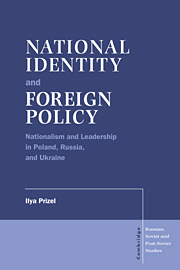Book contents
- Frontmatter
- Contents
- Preface
- Introduction: statement of arguments
- 1 National identity and foreign policy: a dialectical relationship
- 2 Polish identity 1795–1944: from romanticism to positivism to ethnonationalism
- 3 Poland after World War II: native conservatism and the return to Central Europe
- 4 Polish foreign policy in perspective: a new encounter with positivism
- 5 Russia's national identity and the accursed question: a strong state and a weak society
- 6 Russian identity and the Soviet period
- 7 Russia's foreign policy reconsidered
- 8 Ukraine: the ambivalent identity of a submerged nation, 1654–1945
- 9 Ukraine after World War II: birth pangs of a modern identity
- 10 Foreign policy as a means of nation building
- 11 Conclusion: national identity and politics in the age of the “Mass-Man”
- Index
- Cambridge Russian, Soviet and Post-Soviet Studies
4 - Polish foreign policy in perspective: a new encounter with positivism
Published online by Cambridge University Press: 18 December 2009
- Frontmatter
- Contents
- Preface
- Introduction: statement of arguments
- 1 National identity and foreign policy: a dialectical relationship
- 2 Polish identity 1795–1944: from romanticism to positivism to ethnonationalism
- 3 Poland after World War II: native conservatism and the return to Central Europe
- 4 Polish foreign policy in perspective: a new encounter with positivism
- 5 Russia's national identity and the accursed question: a strong state and a weak society
- 6 Russian identity and the Soviet period
- 7 Russia's foreign policy reconsidered
- 8 Ukraine: the ambivalent identity of a submerged nation, 1654–1945
- 9 Ukraine after World War II: birth pangs of a modern identity
- 10 Foreign policy as a means of nation building
- 11 Conclusion: national identity and politics in the age of the “Mass-Man”
- Index
- Cambridge Russian, Soviet and Post-Soviet Studies
Summary
Before our very eyes Communism, the curse of the twentieth century, is dying, and with it the Soviet empire, the curse of my nation, but I cannot be happy. I am scared.
Adam MichnikThe collapse of communism transformed Poland's neighbors beyond recognition and revolutionized Poland's geopolitical position. In October 1990, Germany reunited and undertook a massive reconstruction program of the eastern provinces. The Soviet Union suddenly ceased to exist in December 1991, creating four new countries on Poland's border. Poland and the international system found themselves facing the German economic powerhouse in the west and an unstable and insecure Russian state in the east, still imposing in size despite the loss of the constituent Soviet republics. In January 1993, Czechoslovakia's contentious experiment with a multinational state finally came to an end as the “Velvet divorce” made two states out of one.
Despite the storm of change in Eastern and Central Europe and chronically weak governments in Poland, Polish foreign policy has remained remarkably consistent. Although Poles have yet to agree on central questions, such as how to create a market economy, the role foreign capital should play in the new economy, or the role of the Catholic Church in a democratic Poland, Poles of all political orientations have managed to reach a consensus on foreign policy. This consensus evolved over the years through the efforts of both leftist intellectuals and the Catholic Church and reflects Poland's acceptance of its identity as a mid-size European state, its renunciation of a mission beyond its frontiers, an understanding of the restrictions imposed by its geopolitical position between Germany and Russia, and attempts to limit itself to those events which Warsaw can affect.
- Type
- Chapter
- Information
- National Identity and Foreign PolicyNationalism and Leadership in Poland, Russia and Ukraine, pp. 109 - 152Publisher: Cambridge University PressPrint publication year: 1998



